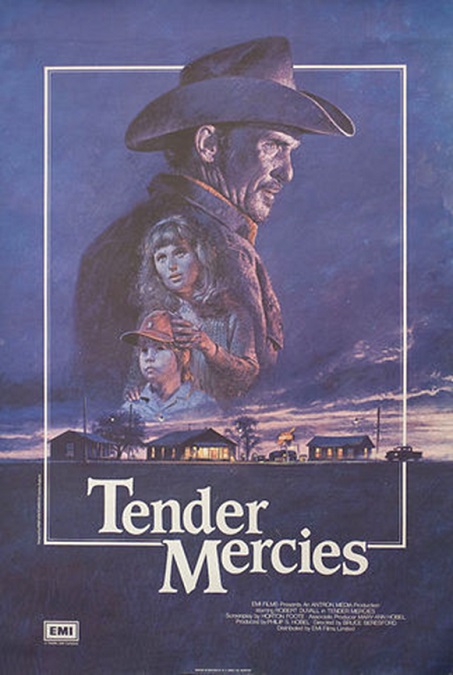
Tender Mercies – 1983
This was a light movie. There was nothing heavy or terribly deep about it. The drama was always present, but not very intense. The performances were good, but not overly engaging. But all that being said, it was a well-made film. There was a subtlety about it that never disappeared and which kept the pace going. The movie’s energy was low but unwavering. It was slow, but consistent.
The movie was about a washed up country-western singer named Mac Sledge, played by Robert Duvall. He starts out as an extreme alcoholic who is passed out on the floor of a cheap motel room floor. He wakes to find himself alone and completely broke. The owner of the motel is Rosa Lee, played by Tess Harper. She and her son, Sonny, played by Allan Hubbard, live alone as the woman’s husband had been killed in Vietnam. Mac offers to work as a handyman to pay for his room and board.
He stays long enough for a relationship to form between him and the widow. Eventually he marries her, and this all takes place in the first 15 minutes or so of the movie. The rest of the film is about how Mac struggles to put his life back together, despite the difficulties of his past. I think my main problem with his character arch is that his transformation from drunk and on the floor to good husband and father happened too quickly. After he marries Rosa Lee, he becomes a bit of a saint and he stays that way until the end of the film, despite little hardships that happen to him.
For example, at one point he tries writing country music again and when he takes some music to his ex-wife, Dixie Scott, a popular country-western singer played by Betty Buckley, she rejects his work. He becomes angry and depressed. He almost starts drinking again but doesn’t. But just think of the deeper dramatic potential that was just missed because he didn’t hit the bottle again. I think that a more dramatic story arch might have been Mac as he started drinking again, maybe even beating Rosa Lee. But because of his love for Rosa Lee, he could fight to get sober, reconcile with her, and still revive his career.
But none of that happened. He never drinks again. He quickly gets over having his song rejected. He converts to Christianity and gets baptized. He joins a band and starts singing again, encounters a tragedy which I’ll comment on in a bit, and ends up being a great guy without any obvious flaws. I mean, it was nice to see him be a good husband and father, but honestly, it was a little boring because there was never any indication that he might be anything else. There was no dramatic tension.
There were only two mildly tense moments in the movie. The first was when Mac’s song was rejected. He is shown buying a bottle of alcohol, and then the scene cuts to Rosa Lee and Sonny as they wait for him to come home. But when he eventually does, he confesses to pouring out the contents of the bottle without drinking them. It was nice, but not very dramatic.
The other dramatically strong point in the movie was near the end. Mac’s estranged daughter, Sue Anne, played by a young and gorgeous Ellen Barkin, has gone against her mother’s wishes and made contact with Mac. He is nice to her without asking anything of her. When Sue Anne elopes with a member of Dixie’s band and is subsequently killed in a car accident because of her husband’s drunk driving, Mac questions his new Christian faith. He confesses that he had once been in a car accident and asks why Sue Anne had died and not him.
Duvall won the Oscar for Best Actor for the roll and some say that it was one of the best performances of his career. Maybe that praise is deserved, especially in light of the fact that he not only did all his own singing, but he also wrote all his own songs. Even though I’m not a huge fan of twangy country-western music, I have to give him credit for that. Aside from that, Harper’s acting was adequate, but nothing to write home about. Buckly had a nice little dramatic scene in which she has a breakdown following her daughter’s death. And Wilford Brimley, playing Harry, Dixie’s manager, was good in a simple and steady kind of way. I just wish the movie, overall, had more intensity to it.









You just didn’t get it… not at all! That was precisely the genius… the LACK of intensity made you FEEL their life